Research Literacy is an essential skill in today’s information-saturated world, especially when navigating the enigmatic realm of paranormal research. It’s not enough to simply believe or disbelieve; true understanding requires the ability to critically evaluate evidence, analyze data, and form informed conclusions.
The Quest for Truth: Why Research Literacy Matters
In the world of paranormal research, claims of the unexplained abound. From ghostly apparitions to claims of psychic abilities, it’s easy to get caught up in sensational stories. However, research literacy empowers us to approach these claims with a healthy dose of skepticism and a thirst for verifiable evidence.
Think of it like this: imagine you’re investigating a supposedly haunted house. Literacy research plays a crucial role in how you approach this investigation. Instead of jumping to conclusions at the first creaking floorboard, you carefully document every observation, analyze environmental factors that could explain unusual sounds, and research the history of the location for potential explanations.
Sharpening Your Tools: Essential Skills for Paranormal Research
So, what does research literacy in this field actually entail? Here are a few key components:
- Source Evaluation: Just like when researching any topic, it’s crucial to assess the credibility of your sources. Who conducted the research? What methods did they use? Are there any biases to consider? Learning to discern reliable information from unreliable sources is paramount.
- Understanding Research Methods: Familiarizing yourself with different research methodologies is key to evaluating the strength of evidence. Was it a controlled experiment or anecdotal evidence? Understanding the differences between qualitative and quantitative research is essential. For instance, knowing how to find quantitative research articles can be invaluable.
- Critical Thinking: This is perhaps the most important tool in your arsenal. Don’t accept claims at face value. Question assumptions, look for alternative explanations, and be open to the possibility that something seemingly paranormal might have a perfectly natural explanation.
- Effective Communication: Sharing your findings in a clear, concise, and compelling manner is vital. Whether you’re writing a report, presenting at a conference, or simply discussing your research with fellow enthusiasts, strong communication skills help you contribute meaningfully to the field.
“In the realm of the paranormal, a healthy skepticism paired with rigorous research is paramount. Extraordinary claims require extraordinary evidence.” – Dr. Emily Carter, Paranormal Researcher
Navigating the Labyrinth: Resources for the Aspiring Investigator
Thankfully, there are numerous resources available to help you hone your research literacy skills.
- Journal of Literacy Research and Instruction: This peer-reviewed journal offers insights into effective research practices across various disciplines.
- Research-Based Reading Intervention Programs: While seemingly unrelated to paranormal research, these programs emphasize evidence-based practices, a principle transferable to any field of study.
- Johnson County K State Research and Extension: Local universities and extension programs often offer workshops and resources on research methodologies.
 A screenshot of an online forum dedicated to paranormal research, with users engaged in discussions.
A screenshot of an online forum dedicated to paranormal research, with users engaged in discussions.
Conclusion: Embrace the Journey of Discovery
Research literacy is a journey, not a destination. As you delve deeper into the world of paranormal research, your skills will continue to evolve. Embrace the challenges, celebrate the successes, and never lose sight of the importance of seeking truth through rigorous, evidence-based inquiry. Remember, the most compelling paranormal investigations are those grounded in sound research and a commitment to unraveling the mysteries of the unknown.
Need help with your Paranormal Research? Contact us!
Phone Number: 0904826292
Email: research@gmail.com
Address: No. 31, Alley 142/7, P. Phú Viên, Bồ Đề, Long Biên, Hà Nội, Việt Nam.
Our team is available 24/7 to assist you.